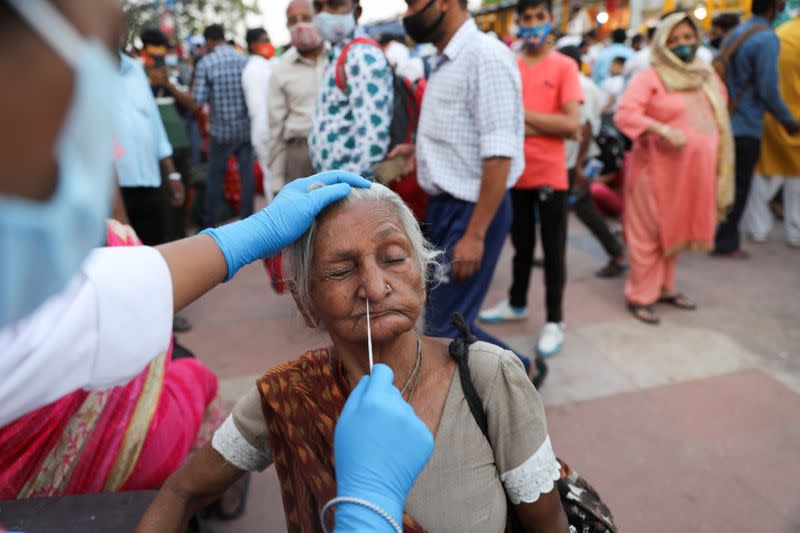What you need to know about the coronavirus right now
(Reuters) - Here's what you need to know about the coronavirus right now:
India's 161,736 new coronavirus infections are world's highest
India reported 161,736 new coronavirus infections on Tuesday, hitting the world's highest daily tally once again, for a total of 13.69 million cases, health ministry data showed.
Deaths rose by 879 to 171,058. Numbers typically fall on Tuesdays because of delayed results from tests done on weekends.
Osaka to report over 1,000 new coronavirus cases on Tuesday
Japan's western region of Osaka is set to report a daily record of more than 1,000 new coronavirus infections on Tuesday, the Yomiuri newspaper said in its online edition. The virus has hit the prefecture, home to 8.8 million people, hard in recent weeks, prompting authorities to enforce targeted lockdown measures.
A highly contagious variant discovered in Britain is driving a fourth wave of cases in western Japan, mostly among younger people, with a record 918 infections on Saturday. Osaka Governor Hirofumi Yoshimura has cancelled Olympic Torch relay runs on public streets.
Gavi, World Bank urge countries to release excess vaccines
World Bank President David Malpass and José Manuel Barroso, chair of the Gavi vaccine alliance, on Monday discussed the importance of countries with excess COVID-19 vaccine supplies releasing them as soon as possible, the World Bank said.
Malpass expressed his desire to work closely with Gavi on a 2022 strategy, including helping expand vaccine production capacity for developing countries, the bank said in a statement. The two officials also discussed the need for more transparency by countries, suppliers and development partners on vaccine contracts, and regarding national export and supply commitments and requirements, the bank said.
British variant not as severe as feared - The Lancet
A highly contagious variant of COVID-19 first identified in Britain does not cause more severe disease in hospitalised patients, according to a new study published in the medical journal The Lancet Infectious Diseases on Monday.
The strain, known as B.1.1.7, was identified in Britain late last year and has become the most common strain in the United States, according to the United States Centers for Disease Control and Prevention.
More therapeutics but no surge in vaccine for Michigan
The White House said on Monday it was prepared to send additional therapeutic treatments to the state of Michigan, which is experiencing a worrying number of COVID-19 cases, but declined to promise more vaccine as the state has sought.
In the week ended April 11, Michigan reported the highest number of new cases per capita of all 50 states and also led the country in hospitalizations per capita. Around 39% of new cases in Michigan were of the more contagious B.1.1.7 variant.
(Open https://tmsnrt.rs/2WTOZDR in an external browser to see details on other U.S. states.)
Most antibody drugs ineffective against Brazil variant
The coronavirus variant first identified in Brazil, known as P.1, is resistant to three of the four antibody therapies with emergency use authorization in the United States, according to a laboratory study.
In test-tube experiments, researchers exposed the P.1 variant to various monoclonal antibodies, including the four currently being used to treat U.S. COVID-19 patients - imdevimab and casirivimab from Regneron Pharmaceuticals, and bamlanivimab and etesevimab from Eli Lilly and Co. Only imdevimab retained any potency, researchers found.
(Compiled by Karishma Singh; Editing by Ana Nicolaci da Costa)

 Yahoo Finance
Yahoo Finance 

